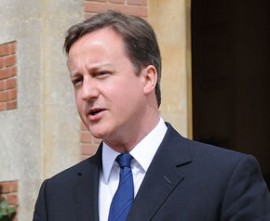
The promise by the prime minister of a new policy on Europe to be outlined in a speech in January rules out most useful comment on the issue between now and then. For the same reason that a referendum on EU membership while the eurozone crisis is still not settled makes no sense – what kind of EU would we be voting on? – criticism of Tory policy has to wait until we find out what that policy is.
But if we can’t criticise the policy yet, we can still lay out the problem that the new policy needs to solve. The problem is that the eurosceptic demands of the EU are ones which the EU cannot meet. Britain wants less single market regulation, we say, except in the areas where it benefits us. Detach social policy from the single market; exclude fisheries from the family of common policies; allow financial services to be traded freely across the continent but regulated only nationally: these are our demands. How far are the other member states willing to go in making concessions to satisfy them?
Britain has steadily excluded itself from much influence in the EU in the past few years, so our friends are not as numerous as they once were, and who believes that, even if a set of British demands were met, this would be the end of the matter? British anti-Europeans would simple declare that things were going their way and demand yet more.
The twin-track strategy of anti-European rhetoric while relying on some kind of engagement with the EU is not going to end well. But still, we are jumping ahead: let the prime minster say what he must.
One part of the UK where his new policy will be particularly significant is Scotland. This blog has written previously about the route that would be followed were an independent Scotland to apply for EU membership in its own right. Negotiations to join the EU would take place at the same time as the negotiations to leave the UK, so that Scotland could aim for a simultaneous transition. (Graham Avery describes the scenario in a note for the House of Commons Foreign Affairs Select Committee here.)
Opponents of Scottish independence – unionists, or British nationalists, depending on what you think of them – have been trying to raise the fear that those negotiations will be difficult and protracted – will Scotland have to set up border controls? will it have to join the euro? will it get a budget rebate? will the Spanish agree? – in order to suggest at that a Yes vote for independence would put Scottish EU membership at risk.
Sir David Edward, formerly a judge in the European Court of Justice, demurs. Writing for the Scottish Constitutional Futures Forum, notes that the existing European treaties impose “obligations of good faith, sincere cooperation and solidarity” and that any negotiations would be conducted accordingly. This is a political matter, not a legal one, but it seems wrong to rate too highly the risk that those negotiations might fail.
A rather bigger risk, it seems to me, is that, after a Scottish No vote, the whole UK might vote to leave the EU itself. This is the route down which the anti-Europeans are taking us, and the route down which Scotland would commit to be taken if it voted to stay within the Anglo-Scottish union.
Opinion in Scotland and England differs. A poll conducted for the Times by Populus in June 2012 found this:
| Do you want the UK to be part of the single market in a wider European Community? | Yes | No | Result |
| Scotland | 30 | 44 | -14 |
| England | 32 | 40 | -8 |
| Great Britain | 32 | 40 | -8 |
| Do you want the UK to remain in the European Union, keeping open the option of joining the more integrated Eurozone? | |||
| Scotland | 39 | 40 | -1 |
| England | 36 | 45 | -9 |
| Great Britain | 36 | 44 | -8 |
The Scottish people are notably more pro-European than the English, being between 6 and 8 percentage points more favourable towards the EU. However, Scotland is only around one-tenth the size of England, so its pro-European sentiment is swamped by the opposite view south of the border. One might very well argue that the best way for Scotland to stay in the EU is to vote to leave the UK and escape the electoral preponderance of the English eurosceptics.
Of course, to be sure of this, we will have to wait and see what the prime minister says in his speech in January. Maybe he can save not one but two unions.

If Cameron were to ask the population what they want Re, the EU via a referendum. It would all be settled quickly.
A simple vote to stay in or leave. We’d be out in a shot. Which of course is why Cameron, indeed any leader of the big two and the fourth party (the Libs-Dems) are shit scared of asking us.
This is nonsense. A referendum settles nothing The debate never ceases.
And you miss the real problem.
The UK costs Londoners about £10000 per household per year. The UK is finished. .London must become an independednt city state.
Londoners do not want a paliament that constantly interferes in the way London is run. Inner London has household income five times the UK average. London is a different world to Manchested or Scunthorpe or wherever.
London must be independent.